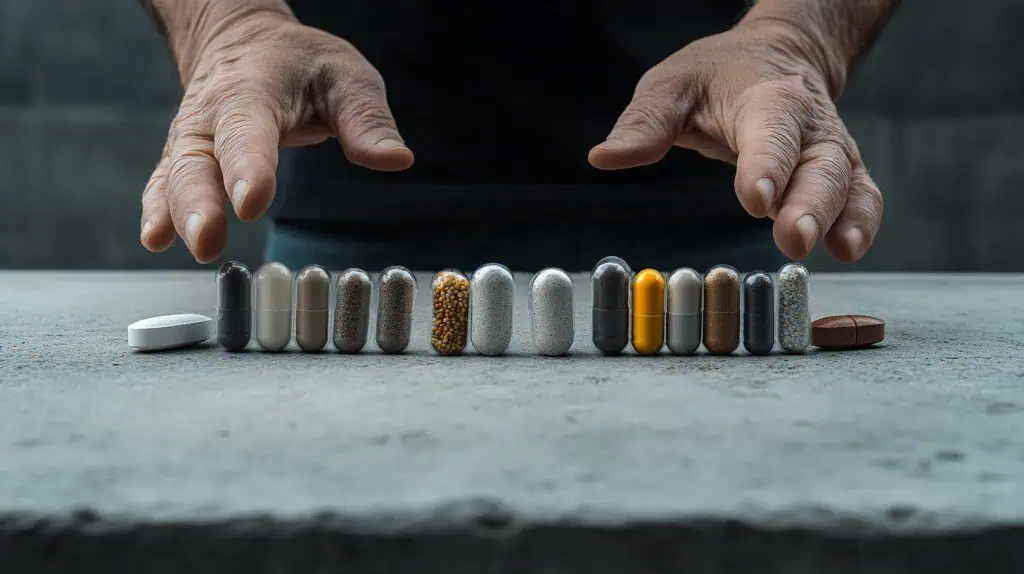This subject was completely new to me, as I have never been one for popping pills. Until I got older and decided I wanted to live as long as possible and as healthy as possible.
After reading deeply and talking to medical experts, how you take supplements is much more nuanced than I ever realized. Doing it right brings way more benefits – and doing it wrong can actually be hazardous for your health.
See which other nutrients could help you live longer from our full list of anti-aging supplements.

Essential Supplements for Seniors
First, let’s very quickly look at what to take. (And for an even deeper dive, have a look at my article on best anti-aging supplements.)
Commonly Used Dietary Supplements
Lots of seniors swear by dietary supplements to cover their nutritional bases and keep their bodies ticking over smoothly. According to the National Health and Nutrition Examination Survey, about 57% of people over 20 pop at least one dietary supplement (CDC).
The big hitters? Multivitamins, vitamin D, and omega-3 fatty acids.
|
Supplement |
Purpose |
|---|---|
|
Multivitamins |
General health and feeling good |
|
Vitamin D |
Strong bones, better calcium absorption |
|
Omega-3 Fatty Acids |
Keeping your heart and brain in shape |
If you’re looking for more info on vitamins as we age, you might be interested in my anti-aging supplements guide.
Importance of Multivitamins
Multivitamins are the bread and butter of senior supplements. They pack a lot of essentials in the fight against aging: vitamins like A, C, D, E, the Bs, and minerals like magnesium and zinc.
Obviously, the ideal is to get all your vitamins and minerals naturally. But, that’s a lot of food! So, if you’re not hitting all the food groups every day, a multivitamin can step in to save the day.
However, a word of caution – some vitamin combos need careful juggling.
For instance, taking calcium with a vitamin D supplement (to ward off osteoporosis) and a multivitamin containing vitamin D may raise calcium enough to increase the risk of forming kidney stones (Mayo Clinic).
If you’re interested in what makes multivitamins a win, you might want to read my article on fat-soluble vitamins for healthy aging.
Benefits of Omega-3 Fatty Acids
Not ready for a complete lifestyle makeover? Omega-3 supplements are the place to get started.
Omega-3 fatty acids are like a magic potion for the heart, but their magic doesn’t stop there. Mostly found in fish oil, they’re also brain boosters and inflammation fighters.
They’re connected to lower heart disease risk, sharper brain function, and even help with depression and arthritis.
|
Benefits |
Omega-3 Sources |
|---|---|
|
Heart Health |
Cold-water fatty fish like salmon, mackerel, tuna, herring, and sardines |
|
Cognitive Boost |
Walnuts, flaxseeds, and chia seeds. Plant oils – flaxseed, soybean, canola |
|
Ease Inflammation |
Eggs, avocadoes edamame, and seaweed |
Just keep an eye out for potential clashes – especially if you’re on blood thinners like Warfarin since omega-3s can increase the risk of bleeding.
Understanding Supplement Interactions
It may be tempting, but you don’t want to take as much as you can of everything you can. How supplements interact can actually affect your health.
Calcium and Magnesium Ratio
Keeping your calcium and magnesium balance is important. Who knew?
The balance of calcium and magnesium is important for several reasons:
- Bone health: Calcium and magnesium compete to be absorbed in the small intestine, so an imbalance can harm bone health.
- Muscle function: The balance of calcium and magnesium plays a key role in skeletal muscle function.
- Disease risk: A high or low calcium-to-magnesium ratio can modify the effects of calcium and magnesium on disease risk. For example, one study found that a high ratio was associated with an increased risk of several cancers.
The ideal calcium-to-magnesium ratio in the diet is generally considered to be between 2:1 and 3:1. A ratio within this range can help prevent weak bones and may be protective against colorectal cancer.
A lopsided ratio, where calcium hogs the limelight, has been associated with an increased risk of metabolic, inflammatory, and cardiovascular disorders. (NIH).
|
Ratio |
Health Impact |
|---|---|
|
Higher than 3:1 |
Can interfere with magnesium absorption, increase the risk of blood clots, and reduce the effectiveness of magnesium for bone health |
|
Lower than 2:1 |
Can adversely impact people who already have low calcium intake |
And if you’re curious about how all this connects with aging gracefully, have a look at my anti-aging minerals guide.
Risks of Green Tea Consumption
I know, sounds a bit crazy! How’s a cup of tea going to harm you?!
Green tea has been a very trendy health drink lately. But too much can rob your body of iron. EGCG, its star player, loves to bond with iron, making it harder to get what you need. So, enjoy it, but maybe not by the gallon.
| Component | Interaction | Risk |
|---|---|---|
| EGCG | Hogs iron | Iron Deficiency Anemia (hair loss, fatigue, brittle nails, headaches, etc.) |
Vitamin C and B12 Absorption
Here’s one more plot twist: vitamin C playing the villain against B12’s absorption. The fix? Give them some space – about two hours apart.
I know what you’re thinking… how do I do that when they’re combined in a multivitamin? The amounts are typically smaller, so it’s less of a problem.
If you want to know more about how vitamin C can help you age like a fine wine, take a look at my article on vitamin C’s anti-aging benefits.
Herbal supplements
Herbal supplements can pose a risk in polypharmacy patients (people who take multiple medications – typically, five or more). That’s because they may affect the metabolism of a particular medication or other supplements.
Resveratrol, which is found in grape skins, is often taken as an antioxidant supplement. Some evidence suggests that it can slow the metabolism of certain common medications and cause side effects.
Gingko Biloba and Blood Thinners
Gingko biloba, which is used for memory, can have an anti-platelet effect, increasing the risk of severe bleeding in those patients already taking anticoagulants such as Warfarin or Apixaban.
In the end, think of these interactions as secret whispers between your body and the bottles on your shelf. Speak to your healthcare provider for some wisdom tailored to you.

Managing Supplement and Medication Interactions
Risks of Concurrent Use
Knowing the risks of juggling supplements with prescribed meds could literally be a lifesaver. Sometimes, mixing those innocent-looking vitamins with your prescribed meds can eventually book you a place in the queue at the ER.
I’ve definitely been caught out before by some vitamins and meds that have matching active ingredients. You think you’re taking one dose, but your body’s getting a double whammy you didn’t sign up for.
Potential Herb-Drug Interactions
And let’s not forget herbal stuff living side-by-side with prescription meds. Turns out, about one in three “older adults” (that’s you and me) indulge in both and might be tip-toeing into a danger zone (PubMed Central).
| Herb/Supplement | Potential Interaction with Medication | Risky Business |
|---|---|---|
| St. John’s Wort | Antidepressants | Can lead to a potentially life-threatening increase in your body’s levels of serotonin |
| Ginkgo Biloba | Blood thinners | Can increase the risk of severe bleeding |
| Echinacea | Immunosuppressants | May reduce the effectiveness of meds that suppress the immune system |
| Garlic Supplements | Blood pressure meds | Might lower blood pressure even further |
| Ginseng | Diabetes meds | May lower blood sugar levels even further |
These plant-based supplements can seriously mess with how your medications work, so a chat with your doctor is the way to go before you mix ‘n’ match.
Preventative Measures for Seniors
To steer clear of these mix-ups and keep our tickers ticking, we have to get smart:
For a deeper dive, you can see my write-up on supplement dosage for seniors. I’ve also written a quality supplements guide.
Optimal Supplement Intake for Aging Well
Getting older has made me realize that our body’s needs shift with time. The stuff that kept us going in our youth just doesn’t cut it as well as it used to. So here’s what I’ve found out about taking supplements in older age.
Nutrient Needs for Older Adults
As we age, absorbing some nutrients gets a bit trickier. Things like vitamins B6 and B12, iron, and calcium can be harder to get enough of because our stomachs mellow out and produce less acid.
And you’ll need more calcium and vitamin D, especially if you’re over 70, when bone mass decreases. Muscle mass also falls, so you might need to consume more protein as you get older (Healthline).
| Nutrient | Age Group | Recommended Daily Intake |
|---|---|---|
| Vitamin B12 | 50+ | 2.4 μg |
| Calcium | 70+ | 1,200 mg |
| Vitamin D | 70+ | 800 – 4,000 IU |
| Protein | 65+ | 1.0-1.2 g/kg of body weight |
Recommended Supplementation for Seniors
So, some supplements will really give us over 50s a boost. Vitamin D is a biggie. Our body produces less as we get older, just when we need more.
Vitamin B12? A must-have. A shortage of B vitamins seems to play a role in cognitive function and heart health.
Coenzyme Q10, or CoQ10, has also proven its worth. As we get older, levels drop, and topping them up can fend off those same health issues like heart problems and Alzheimer’s (Healthline).
You can read more about the benefits of CoQ10 for seniors.
And don’t forget Omega-3 fatty acids. They’re tops for heart health and calming down inflammation. If you’re not getting enough via food, a supplement can fill in the gaps.
| Supplement | Primary Benefit | Recommended Daily Intake |
|---|---|---|
| Vitamin D | Bone health | 800-1,000 IU |
| Vitamin B12 | Cognitive health | 2.4-3.0 μg |
| CoQ10 | Heart health | 100-200 mg |
| Omega-3 | Anti-inflammatory | 1,000 mg |

Avoiding Harmful Supplement Combinations
As someone who’s tuning into their health late in life, getting a grip on how different supplements dance together – or don’t – has been a learning curve. Let’s walk through some combinations.
Iron and Calcium Interactions
They’re both important for your body, but throwing them down the hatch together isn’t ideal. Nature Made points out that they like to fight it out for which gets absorbed first. So, taking them at the same time is less beneficial.
To make sure you’re getting what you paid for, space them out: Iron in the morning, Calcium in the evening.
Iron and Zinc
If you take an iron supplement with a Zinc supplement on an empty stomach, this combo may block Zinc absorption. It’s not recommended to take an iron supplement on an empty stomach.
Calcium, Zinc and Magnesium
As noted above with the Iron and Calcium, Calcium will compete for absorption with other minerals. Since Calcium can affect how your body absorbs Iron, it can also affect the absorption of Zinc and Magnesium, too (Mayo Clinic).
While it’s OK to take them together in a multivitamin (which typically contains smaller doses), it’s best to space out these supplements if you’re taking them individually.
Copper and Zinc
If you’re taking a Zinc supplement, don’t take it at the same time as Copper, Iron, or Phosphorus supplements. Instead, space them out a couple of hours apart (Mayo Clinic).
As a general rule, large amounts of minerals taken at the same time as other minerals will reduce absorption of each other.
Dangers of High Dose Combinations
More isn’t always the merrier with supplements. Sometimes going all in can backfire big time.
Taking high doses of Vitamin C, for instance, might mess up how your body handles Vitamin B12. Over time, that could cause a B12 shortage. So, it’s better to take Vitamin C and B12 a couple of hours apart.
Here’s a little cheat sheet for when to pop these vitamins:
|
Supplement |
Suggested Timing |
|---|---|
|
Iron |
Morning |
|
Calcium |
Evening |
|
Vitamin C |
After meals (ideally with iron) |
|
Vitamin B12 |
With meal/snack and a glass of water |
|
Multivitamins |
With largest meal of the day |
Safe Practices for Supplement Intake
Keeping it safe with supplements is about more than just choosing them right—it’s about using them smart:
Being savvy with your supplements means you get the goodies without the grief. Stick to these tips and team up with your healthcare provider to stay ahead of the game with your health.
Further reading on RichardRiviere.com…
If you’re interested in learning more about supplements, you can read my articles on…
The Bottom Line
As we get older, our needs for certain nutrients, such as protein, calcium, vitamin D, iron, and B vitamins, can change.
Not everyone needs supplements, but they can be useful for older adults who have difficulty meeting their nutritional needs through diet alone.
Just be sure to buy good quality supplements, use them only as directed, and talk with a healthcare professional before trying new ones.
Editorial Process
We believe in writing honest and unbiased reviews based on real-world experience. For more details, read our editorial process.
Some of the links in this article may be affiliate links, which can compensate us at no cost to you if you make a purchase. These are products we’ve personally used and tested. This site is not intended to provide financial or health advice. You can read our affiliate disclosure in our privacy policy.
Richard Riviere is a former 9-5er who was fat, frazzled, and fifty.
“There has to be more to life than this”, he decided. So, quit his 30-year career to research how to become healthier and wealthier after 50.
He now teaches other midlifers how to start living life on their own terms again.
